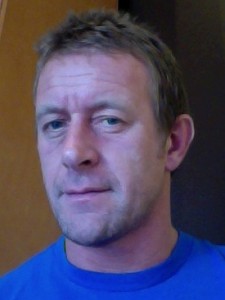I am pleased to introduce to you a passionate Mystery/Suspense novelist who “…grabs you by the throat and never lets you go”. He is presently carving his way through the Self-Publishing world, has been featured on “Pixel of Ink” and was just announced as Indy Author’s “Rockstar of the Month”.
Although Barry Crowther now resides along the beautiful Southern California coast, he is still a true Mancunian at heart. A Mancunian you say? For those of you who are curious, a Mancunian is a demonym for someone who is from Manchester, a city in the Northwest of England.
Apparently Barry has something in common with our previous guest, Colin Falconer. Both are huge fans of Manchester United, an English professional football club based in, where else? None other than Manchester, England of course. According to Barry, that’s part of the reason why Manchester is so sexy.
And according to Barry’s father, “If you can’t be smart or you can’t be funny, then be brief.”
Well then, I’ll get straight to the point. Take it away Barry!
Thank you Karen.
As you know, when writing a good story, especially one that is filled with mystery and suspense, great care goes into the process to keep the reader on the edge of his seat. But what works for one novelist may not work for another. So I ask, “What is your preference?”
Organic vs Plotting
Do you have a system for writing? Do you Plot or Write Organically?
This is a great question. I was asked this during a recent interrogation interview. It was a cool question and made me realize that I actually do both.
For the Matt Spears Mysteries I tend to plot in great detail. I use a really cool tool named Scrivener and this lets me see things in a global fashion (pretty much the whole story) and then allows me to switch to a more detailed scene outline. A great writer called David Hewson (he’s currently writing the novels based on the TV show The Killing) is a great example of plotting with Scrivener. I am meticulous in this department and it takes me longer piecing the plot together than actually writing the scenes!
Once I move over to the process of writing the scenes, a character sometimes takes a left turn that wasn’t plotted and this might throw a spanner (wrench) in the works. One interesting example of this was from Missing. I knew who the perpetrator of the crime was before I wrote the first scenes, but by the time I got to the last 10% of the writing I woke up one morning and thought that it made more sense for another character to be the actual bad guy. I was already 80,000 words in but was still happier to go back and change the plot than be stuck with a story where I was unhappy with the ending.
Like my other post about Twisting the Plot, sometimes we even surprise ourselves. If that happens, surely you are going to outwit the reader.
Now, for Nothing, I was frazzled after completing a previous writing assignment and I didn’t want to start plotting again. So as a break I took a pad and sat in the sunshine outside Starbucks each afternoon and just doodled a story. The opening line was something I really liked: “Looking at the spot where my sister was murdered I felt nothing.” From this line I wrote 40,000 words long hand. I then typed the whole thing back into Scrivener and edited it there, then put it out as a Kindle Novella—the reviews (so far) have been stellar.
I am working on the prequel to Nothing using the same system and writing technique**. I write longhand and am into it around 10,000 words. It’s still a great feeling, my hand moves so quickly and I don’t seem to be hitting any sticking points right now. I always conclude a writing session with something dangling (no, not what you’re thinking), I use some form of connecter or cliff hanger like a new character showing up or something being discovered which is a shocker at that point in the story when I sit down next time I don’t have trouble lifting off again. Works for me.
Any ideas on how a novel grows – do we plot or do we dust off an artifact as Stephen King writes? Interesting, but I think the bottom line is – whatever works for you, use it.
**: I also changed my style of writing dramatically for Nothing. It’s written first person present tense. This makes the pace a little breathless with a lot happening in each scene. It’s a Novella, so no one’s had a heart attack yet.
I hope this information will help all of you in your writing endeavors.
Thank you very much for inviting me Karen.
Barry Crowther
http://barrycrowther.com
No, thank you Barry Crowther!
Good to know that no one has had a heart attack yet!
So what do you think? Do you write Organically or are you a Plotter? What kind of books do you enjoy writing? Do you like Mystery and Suspense? Or do you prefer a little Romance? Perhaps you like to write for a younger audience, Children or YA. Or maybe non-fiction is your cup of tea.
If you enjoyed this, I encourage you to follow by email for future posts.
Thank you for your many thoughts and kind comments everyone!
Karen
A big shout out to Kristen Lamb and to all my new WANA classmates and friends. And a big thanks to all others that may grace my presence by visiting this post. Take care and make it a great day!
